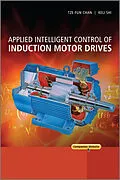Induction motors are the most important workhorses in industry. They are mostly used as constant-speed drives when fed from a voltage source of fixed frequency. Advent of advanced power electronic converters and powerful digital signal processors, however, has made possible the development of high performance, adjustable speed AC motor drives. This book aims to explore new areas of induction motor control based on artificial intelligence (AI) techniques in order to make the controller less sensitive to parameter changes. Selected AI techniques are applied for different induction motor control strategies. The book presents a practical computer simulation model of the induction motor that could be used for studying various induction motor drive operations. The control strategies explored include expert-system-based acceleration control, hybrid-fuzzy/PI two-stage control, neural-network-based direct self control, and genetic algorithm based extended Kalman filter for rotor speed estimation. There are also chapters on neural-network-based parameter estimation, genetic-algorithm-based optimized random PWM strategy, and experimental investigations. A chapter is provided as a primer for readers to get started with simulation studies on various AI techniques. * Presents major artificial intelligence techniques to induction motor drives * Uses a practical simulation approach to get interested readers started on drive development * Authored by experienced scientists with over 20 years of experience in the field * Provides numerous examples and the latest research results * Simulation programs available from the book's Companion Website This book will be invaluable to graduate students and research engineers who specialize in electric motor drives, electric vehicles, and electric ship propulsion. Graduate students in intelligent control, applied electric motion, and energy, as well as engineers in industrial electronics, automation, and electrical transportation, will also find this book helpful. Simulation materials available for download at href="http://www.wiley.com/go/chanmotor">www.wiley.com/go/chanmotor
Autorentext
Tze-Fun Chan is an associate professor of electrical
engineering at the Hong Kong Polytechnic University, where he has
been working for over 30 years since 1978. Chan's research
interests are self-excited induction generators, brushless AC
generators, permanent-magnet machines, finite element analysis of
electric machines, and electric motor drives control. In June 2006,
Chan was awarded a Prize Paper by IEEE Power Engineering Society
Power Generation and Energy Development Committee. In 2007, Chan
co-authored a book published by Wiley. He received the B.Sc. and
M.Phil degrees in electrical engineering from the University of
Hong Kong in 1974 and 1980 respectively. He received his PhD degree
in electrical engineering from City University London in 2005.
Keli Shi is a Research Engineer of Netpower Technologies
Inc.. His research interests are DSP applications and intelligent
control of induction and permanent magnet machines. He received his
BS degree in electronics and electrical engineering from Chengdu
University of Science and Technology and MS degree in electrical
engineering from Harbin Institute of Technology in 1983 and 1989
respectively. He received his PhD in electrical engineering from
The Hong Kong Polytechnic University in 2001.
Inhalt
Preface xiii
Acknowledgments xvii
About the Authors xxi
List of Symbols xxiii
1 Introduction 1
1.1 Induction Motor 1
1.2 Induction Motor Control 2
1.3 Review of Previous Work 2
1.3.1 Scalar Control 3
1.3.2 Vector Control 3
1.3.3 Speed Sensorless Control 4
1.3.4 Intelligent Control of Induction Motor 4
1.3.5 Application Status and Research Trends of Induction Motor Control 4
1.4 Present Study 4
2 Philosophy of Induction Motor Control 9
2.1 Introduction 9
2.2 Induction Motor Control Theory 10
2.2.1 Nonlinear Feedback Control 10
2.2.2 Induction Motor Models 11
2.2.3 Field-Oriented Control 13
2.2.4 Direct Self Control 14
2.2.5 Acceleration Control Proposed 15
2.2.6 Need for Intelligent Control 16
2.2.7 Intelligent Induction Motor Control Schemes 17
2.3 Induction Motor Control Algorithms 19
2.4 Speed Estimation Algorithms 23
2.5 Hardware 25
3 Modeling and Simulation of Induction Motor 31
3.1 Introduction 31
3.2 Modeling of Induction Motor 32
3.3 Current-Input Model of Induction Motor 34
3.3.1 Current (3/2) Rotating Transformation Sub-Model 35
3.3.2 Electrical Sub-Model 35
3.3.3 Mechanical Sub-Model 37
3.3.4 Simulation of Current-Input Model of Induction Motor 37
3.4 Voltage-Input Model of Induction Motor 40
3.4.1 Simulation Results of 'Motor 1' 43
3.4.2 Simulation Results of 'Motor 2' 43
3.4.3 Simulation Results of 'Motor 3' 44
3.5 Discrete-State Model of Induction Motor 45
3.6 Modeling and Simulation of Sinusoidal PWM 49
3.7 Modeling and Simulation of Encoder 51
3.8 Modeling of Decoder 54
3.9 Simulation of Induction Motor with PWM Inverter and Encoder/Decoder 54
3.10 MATLAB/Simulink Programming Examples 55
3.11 Summary 73
4 Fundamentals of Intelligent Control Simulation 75
4.1 Introduction 75
4.2 Getting Started with Fuzzy Logical Simulation 75
4.2.1 Fuzzy Logic Control 75
4.2.2 Example: Fuzzy PI Controller 77
4.3 Getting Started with Neural-Network Simulation 83
4.3.1 Artificial Neural Network 83
4.3.2 Example: Implementing Park's Transformation Using ANN 85
4.4 Getting Started with Kalman Filter Simulation 90
4.4.1 Kalman Filter 92
4.4.2 Example: Signal Estimation in the Presence of Noise by Kalman Filter 94
4.5 Getting Started with Genetic Algorithm Simulation 98
4.5.1 Genetic Algorithm 98
4.5.2 Example: Optimizing a Simulink Model by Genetic Algorithm 100
4.6 Summary 107
5 Expert-System-based Acceleration Control 109
5.1 Introduction 109
5.2 Relationship between the Stator Voltage Vector and Rotor Acceleration 110
5.3 Analysis of Motor Acceleration of the Rotor 113
5.4 Control Strategy of Voltage Vector Comparison and Voltage Vector Retaining 114
5.5 Expert-System Control for Induction Motor 118
5.6 Computer Simulation and Comparison 122
5.6.1 The First Simulation Example 123
5.6.2 The Second Simulation Example 125
5.6.3 The Third Simulation Example 126
5.6.4 The Fourth Simulation Example 127
5.6.5 The Fifth Simulation Example 129
5.7 Summary 131
6 Hybrid Fuzzy/PI Two-Stage Control 133
6.1 Introduction 133
6.2 Two-Stage Control Strategy for an Induction Motor 135
6.3 Fuzzy Frequency Control 136
6.3.1 Fuzzy Database 138
6.3.2 Fuzzy Rulebase 139
6.3.3 Fuzzy Inference 141
6.3.4 Defuzzification 142
6.3.5 Fuzzy Frequency Controller 142
6.4 Current Magnitude PI Control 143
6.5 Hybrid Fuzzy/PI Two-Stage Controller for an Induction Motor 145<...
